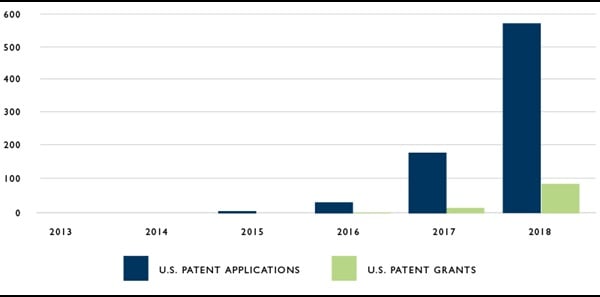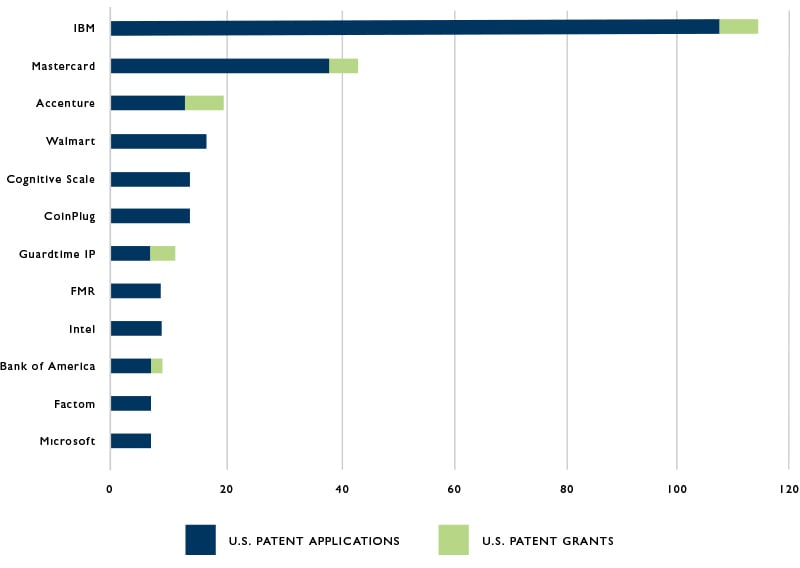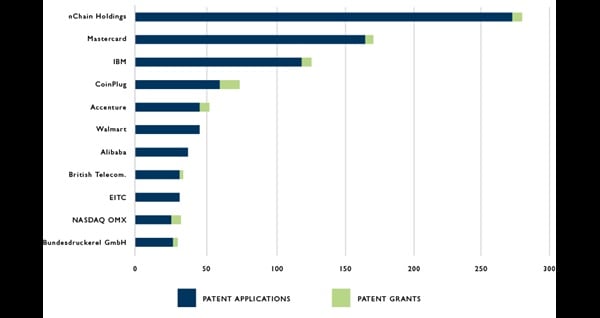More than just one of the hottest buzzwords of 2018, “blockchain” is “a quiet revolution.”1 The impact of blockchain technology on our day-to-day lives is still uncertain. But one thing is clear: The opportunity is ripe for innovation.
One example of this is the significant increase in blockchain-related patent applications filed over the last four years. More and more blockchain-related patent applications2 are being filed as innovators seek to facilitate monetization of a technology that is primed to change the way we do business.
U.S. Blockchain Patents & Patent Applications

No blockchain-related patent applications were published as of 2014.3 Only six applications were published in 2015, and the first blockchain-related patent did not issue until 2016. But since then, the trend has been impressive. In 2016, 34 applications published, followed by 186 in 2017. By the end of the 2018, 580 patent applications had been published, with more applications published in November and December of 2018 than in all of 2017.
The potential upside to patenting groundbreaking innovation is significant, providing a patent owner with the option to exclude competitors, license and profit from the invention, or demonstrate the value of its technology and business. That said, the process of obtaining a patent is not easy. It often takes years, requires a fair amount of financial investment, and, particularly in the case of computer-enabled technology, entails accepting the uncertainty of whether the technology will be considered patentable. So who is running this block party?
Top Ten U.S. Blockchain Patent Applicants

The companies that have pursued patent protection and decided that blockchain-related technology is worth the effort are a mix of Fortune 500 companies and startups, technology and financial services companies. IBM leads the charge with over 110 published applications in 2018. IBM was tied with Accenture for most successful patent grants with seven issued blockchain patents.
Across the top applicants, granted blockchain patents range from those directed to alterations of the base or foundation of the blockchain algorithm (e.g., rewritable blockchain, changing an existing blockchain, etc.) to specific uses of blockchain technology (e.g., switching telephone service providers, indicating when a product arrives at a destination, etc.). The granted claims are primarily method claims, with some system claims also granted.
Many of the top ten U.S. blockchain patent applicants are similarly active on the global playing field.
Top Ten Global Blockchain Patent Applicants

In 2018, nChain Holdings took the lead on overall global patent applications with over 280 total blockchain applications published. As of October 2018, that title was held by Mastercard, with just over 150 published applications, but nChain Holdings filed over 140 applications between October and the end of the year to take the lead. CoinPlug leads the pack for most successful patent grants with 15 issued patents.
If nothing else, current blockchain-related patent trends indicate a significant increase in investment in this technology and an expectation that the technology is here to stay. Time will tell whether the inventions claimed in these patents actually change the way we live, work and play.
- https://hbr.org/2017/02/a-brief-history-of-blockchain.
- Defined in this article as patent applications with “blockchain” in the title, abstract, or claims.
- Note that publication of patent applications may be delayed after they are filed.
.svg?rev=a492cc1069df46bdab38f8cb66573f1c&hash=2617C9FE8A7B0BD1C43269B5D5ED9AE2)
